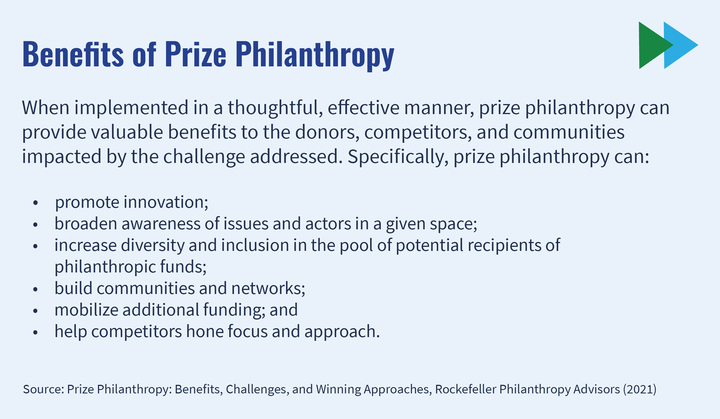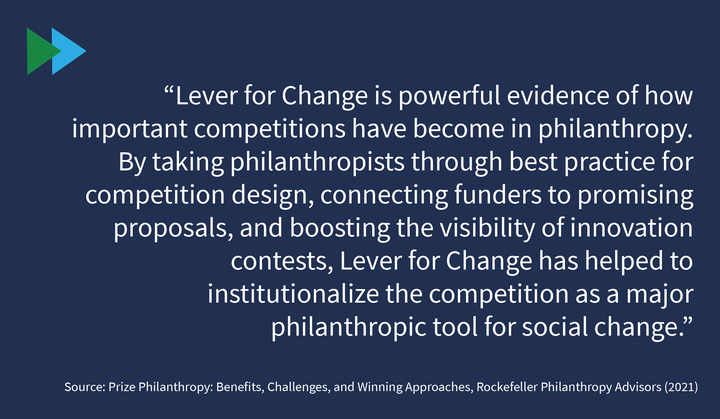Rockefeller Philanthropy Advisors (“RPA”), in partnership with Columbia Business School, and with support from Lever for Change and others, has been taking a deep dive into the world of large-scale prize philanthropy.

We’re pleased to share their findings published in a new report, “Prize Philanthropy: Benefits, Challenges, and Winning Approaches.” This publication is part of RPA’s Philanthropy Roadmap, a series of donor guides created to help create more thoughtful and effective philanthropy around the world.
The report studies the rising popularity of prizes to help philanthropists decide whether and how to use prize philanthropy to achieve their goals. This guide covers how prizes differ from traditional grantmaking, the benefits they offer donors, as well as the challenges they can pose and recommendations for developing competitions.

Every grantmaking process requires a choice—among ideas, organizations or proposals. However, philanthropy is notoriously opaque. Who makes decisions about funding, how, and on what schedule is the subject of endless debate and speculation. In principle at least, prize competitions can provide clear answers.
With proper planning and support, prize philanthropy—whether inducement or recognition-based—can be an extremely rewarding approach for donors looking to expand their impact through new approaches.
Rockefeller Philanthropy Advisors, “Prize Philanthropy: Benefits, Challenges, and Winning Approaches.”
Lever for Change was designed with this power dynamic in mind, helping donors move away from the traditional invitation-only, closed-door model of philanthropy through open and transparent competitions. This means creating opportunities for organizations to compete based on their potential and past achievements, rather than personal connections or their access to a funder’s network. It also means moving the power to define strategy from the funder to nonprofits that are engaged in the work, allowing organizations to submit proposals that might not fit more prescriptive grant processes.
The report by Rockefeller Philanthropy Advisors highlights prizes administered by the Templeton Foundation, the Knight Foundation, the Skoll Foundation, X-Prize, D-Prize, Pritzker Traubert Foundation, and Google.org, as well as Lever for Change’s approach to competitions.

Critically, the report confirms some ideas many people held, but could not prove, and uncovers some important new aspects of prize philanthropy:
- Competitions involve a significant commitment beyond the award. Recruiting, supporting, evaluating, and promoting applicants is time-intensive, and adds direct costs over and above the prize purse.
- Competitions do not have to be a zero-sum game; they can be equitable and fair if they are designed with that goal in mind – from planning to providing feedback, making connections, and strengthening projects to attract further funding.
- Competitions can allow for donor collaboration that can be as loosely structured or specifically defined as desired. From any competition, the pool of applications can be shared with multiple donors, and examined using different screens or rubrics, as desired.
“Understanding the efforts made by many organizers to ensure the competitive process enriches the vast majority of the contenders—even those that don’t make it to the final phase—was one of the most surprising findings,” noted Renee Karibi-Whyte, Vice President of RPA. “Several of the case study examples show the power of this approach to philanthropy even beyond the monetary award.”
Whether it’s to draw attention to an issue, solve a problem, source ideas from outside existing networks, support new cohorts of people and organizations, or other reasons, the new prizes and prize organizations profiled here show the variety of approaches to and motivations for prize philanthropy. Later this summer, we’ll have another update about work Lever for Change and Rockefeller Philanthropy Advisors are doing to ensure the discoveries in one competition can benefit more than one winner, and can benefit from the support of multiple donors.